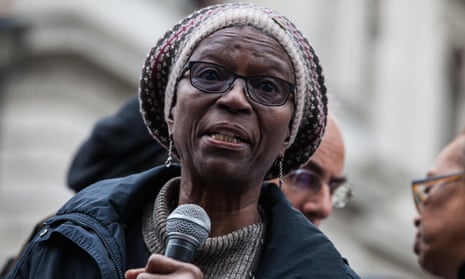Public health bodies, charities and the families of men who died after being restrained by police have condemned the inclusion of a controversial medical term in one of the UK’s leading medical handbooks.
Acute behavioural disturbance (ABD), more commonly known as “excited delirium”, a contentious expression used in fatal cases of police violence, has recently been added to the Maudsley Prescribing Guidelines (MPG).
The term, which divides the medical community, was recently mentioned in the trial of Derek Chauvin, the former US police officer found guilty of the murder of George Floyd, although it was not a key part of the evidence.
It has been argued that the term carries racial biases and is often used to justify lethal use of force by police, disproportionately against black men. It has previously been used in many court cases to describe individuals who become agitated or distressed after using drugs or during a mental health episode. In some instances, those described as experiencing “excited delirium” are perceived to exhibit higher pain thresholds and unusual levels of strength.
It was recently cited in Kevin Clarke’s inquest and the families of Olaseni Lewis and Sean Rigg have said attempts were made to use the term in their inquests but those attempts were quashed by their legal teams.
Ajibola Lewis, the mother of Olaseni Lewis and Marcia Rigg, the sister of Sean Rigg, condemned the inclusion of the term in the guidelines saying it would set a dangerous precedent legitimising its use in future cases involving restraint.
“We have seen too many deaths resulting from the use of restraint in custody: deaths which could have been avoided if only the necessary lessons had been learned from previous deaths in similar circumstances,” they said in a joint statement.
The two women and their families, who have campaigned against deaths in police custody, said evidence suggested a disproportionate number of those who die in such circumstances were black men suffering from mental ill health.
“We also know that healthcare professionals have a critical role to play in this context, and we recognise that the purpose of the guidelines is to assist such professionals in their approach to these cases and their understanding of the underlying circumstances.
“However, the opportunity to shape that approach and understanding – and thereby the learning necessary to prevent deaths resulting from similar circumstances in the future – has been squandered,” they added.
Both the Royal College of Psychiatrists (RCPsych) and the South London and Maudsley NHS trust, which oversaw Clarke, Rigg and Lewis’s clinical care and operates independently of the MPG have also issued statements saying they do not recognise ABD as a medical diagnosis or syndrome.
In a statement RCPsych said it was extremely concerned about the increasing use of the terms and said they could be used in inquests to limit the responsibility of authorities involved in the deaths of those in custody or medical services.
The statement was endorsed by the South London and Maudsley NHS Foundation Trust who stated there was no compelling research evidence to demonstrate or support the use of these terms in medicine.
The trust said the use of the term had led to significant disadvantage for certain ethnic minority groups and that it would be working with the MPG to ensure the guidelines were updated.
However, Ché Donald, the vice-chair of the Police Federation of England and Wales, refuted and condemned the “hugely damaging” RCPsych statement. In a detailed eight-bullet point rebuttal Donald said the RCPsych statement was incorrect and disputed claims of racial discrimination.
Donald, who said he would be referring the matter to the Charity Commission, said the move could impact negatively on every police incident involving individuals with the condition adding that the “highly flawed” statement called into question the impartiality of coroners.
“The RCPsych … should focus its energy and attention on areas it has expertise in, rather than issuing factually incorrect, politicised statements,” he said.
Prof David Taylor, director of Pharmacy and Pathology, senior author and editor of MPG for 27 years, said the fourteenth edition of the guidelines includes a short section on ABD.
“In the text, it is made clear that neither named condition is an accepted diagnosis and it acknowledges that both terms are highly controversial. It is also very clear in recommending that physical restraint should be avoided wherever possible,” he said.
Taylor added that having now consulted with various authorities, he had asked the publishers to make changes to the guidelines reflecting the “sensitivities that surround these terms and the lack of any diagnostic validity”.










